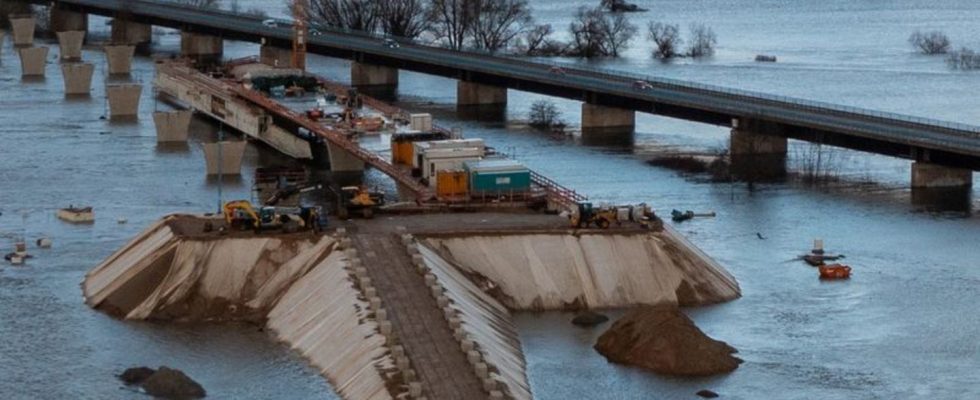Household
Flood situation triggers new debate about debt brake
It is still unclear what costs the damage caused by the flood will incur. The bridge construction site for the A14 northern extension near Wittenberge in Brandenburg is also currently under water. photo
© Stephan Schulz/dpa
The water levels in flood areas in Germany could continue to rise. Floods could have serious consequences for many people. What then?
The Interior Minister of Lower Saxony, which was particularly affected by the floods, Daniela Behrens (SPD), told the Phoenix broadcaster that there would be a lot of damage once the water had receded. “We will have to invest a lot, again in repairing dike protection systems and roads.” Lower Saxony will be dependent on help from the federal government.
SPD budget politicians are pushing ahead
The budget spokesman for the SPD parliamentary group, Dennis Rohde, told the magazine “Stern”: “The full extent of the flood damage cannot yet be foreseen, but for exactly such cases we have the option of suspending the debt brake, which is in the Basic Law.” Whether this financial dimension will be achieved will be examined closely.
Support came from the Greens. Group deputy Andreas Audretsch said: “One thing is certain: we will not leave the people in the flood areas alone with the costs. In order to make the necessary funds available, suspending the debt brake in 2024 is of course also an option.”
However, other voices were heard from the FDP. “The people in Lower Saxony who have to draw water from their cellars these days have other worries than the debt brake,” said parliamentary group leader Christian Dürr. “No one can yet quantify how much damage will be caused. It is completely clear that the federal government will not leave those affected alone.” Parliamentary group vice-president Christoph Meyer said that it was currently not clear that the states and the federal government were financially overwhelmed by the flood. “Suspending the debt brake is therefore currently not justified.”
The federal government wants to wait for the acute phase – Scholz to Saxony-Anhalt
“At the moment it’s about providing very urgent help,” said federal government spokesman Steffen Hebestreit. The Ministry of Defense referred to the use of helicopters, the Interior Ministry to the use of the Technical Relief Agency (THW). Hebestreit said that after the acute phase we have to see how extensive the damage is. Municipalities, states and the federal government would then have to sit down and say how to deal with the situation. “If such a high amount of damage occurs, which we are not assuming at this point, then the federal government can also act,” said Hebestreit. He did not mention the word debt brake.
The government spokesman announced that Chancellor Olaf Scholz (SPD) wanted to visit flood areas in Saxony-Anhalt “in the very near future”. On New Year’s Eve, Scholz found out about the situation, the situation of those affected and the work of the relief workers in Verden, Lower Saxony.
Suspending the debt brake again is already controversial
The debt brake anchored in the Basic Law only provides for a very limited net borrowing. However, it can be suspended in the event of natural disasters or other exceptional emergencies if the state’s financial situation is significantly affected.
As a result of a budget ruling by the Federal Constitutional Court, which caused billions in holes in the federal budget, the Bundestag suspended the debt brake again in mid-December for the year 2023 – for the fourth time in a row. The traffic light government does not want to suspend the debt brake for the 2024 financial year for the time being. However, an exception should be examined with an open mind for the consequences of the flood disaster in the Ahr Valley in 2021. This involves around 2.5 billion euros. In the event of a change in the situation in Ukraine, the traffic light reserves the right to suspend it later and to provide additional credits.
Debate about disaster protection
The current tense flood situation shows how important it is to take flood precautions, explained the Federal Environment Ministry. “The consequences of the advancing climate crisis are presenting us with ever-increasing challenges for which we must prepare even better in the future.” Ten years ago, after the devastating floods on the Danube and Elbe, the national flood protection program was developed by the federal and state governments in order to regain area for natural flood retention. According to the ministry, the majority of the planned measures are still in the conception, planning or approval phase.
A spokesman for Federal Interior Minister Nancy Faeser (SPD) said that in order to further strengthen the THW’s operational capability, the ministry sees a “need” in the financial years 2025 and following. However, he referred to the necessary consultations in the coalition. The city council had already called for significantly more money for disaster protection. In response to a question about structural changes, government spokesman Hebestreit said that disaster protection was very well positioned – and that it was basically a matter for the states.

